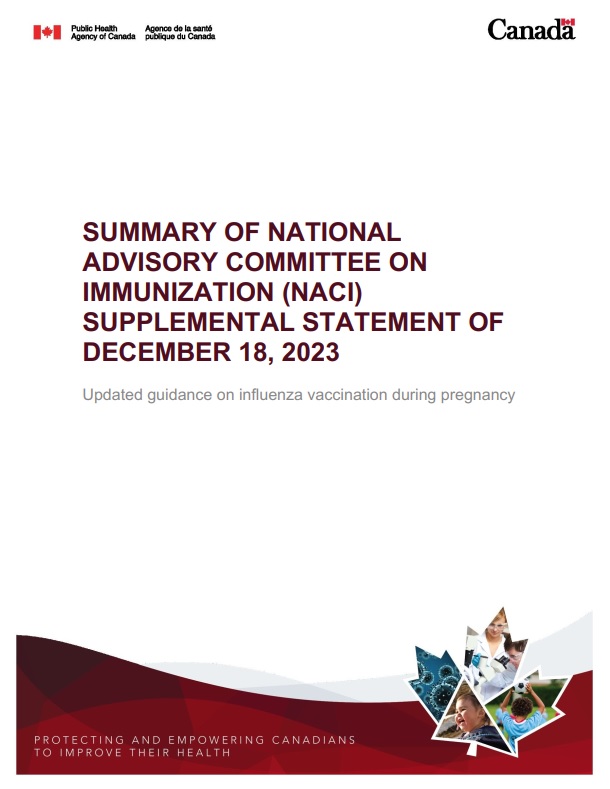Summary of NACI statement of December 18, 2023: Updated guidance on influenza vaccination during pregnancy
Download in PDF format
(296 KB, 5 pages)
Organization: Public Health Agency of Canada
Date published: 2023-12-18
On this page
Overview
- On December 18, 2023, the Public Health Agency of Canada (PHAC) released the National Advisory Committee on Immunization's (NACI) Updated guidance on influenza vaccination during pregnancy. This guidance is based on current evidence and NACI expert opinion.
- Seasonal influenza is a respiratory illness that can result in severe complications, including hospitalization, ICU admission, and even death, particularly for certain vulnerable groups. Pregnant individuals, along with infants under six months of age, are particularly at risk of severe illness from an influenza infection.
- Despite being at high risk of severe illness, uptake of the influenza vaccine is lower among pregnant individuals than people who are not at high risk.
- A recommendation from a healthcare provider is the most important factor when deciding to be vaccinated, therefore ensuring providers are well informed of the most recent evidence and can communicate the importance of seasonal influenza vaccination during pregnancy is important for improving vaccine uptake.
- As a result, NACI recently completed a comprehensive review of evidence from clinical trials and real-world data on the on the safety, efficacy, and effectiveness of influenza vaccination during pregnancy, including the benefits and risks to the developing fetus and infants under six months of age.
- NACI concluded that the evidence continues to support the safety and effectiveness of influenza vaccination during pregnancy. Influenza vaccination reduces the risk of influenza and has no identified link to negative outcomes in pregnant individuals or their infants.
- Following its thorough review:
- NACI continues to strongly recommend that influenza vaccines should be offered annually, at any stage in the pregnancy (i.e. in any trimester).
- NACI continues to strongly recommend the inclusion of all pregnant individuals, at any stage of pregnancy, among those who are particularly recommended to receive influenza vaccination.
- NACI reaffirms its recommendation that influenza vaccination may be given at the same time as, or at any time before or after administration of another vaccine, including the COVID-19 or pertussis vaccine.
- NACI is committed to following vaccine safety information and efficacy/effectiveness data for pregnant individuals as they evolve and will update guidance as needed.
For the full statement, including supporting evidence and rationale, please see the NACI Statement: Updated guidance on influenza vaccination during pregnancy.
For a full list of people who are particularly recommended to receive the influenza vaccine, please see priority groups for influenza vaccination in the NACI statement on seasonal influenza vaccine for 2023–2024.
For more information on NACI recommendations related to seasonal influenza vaccination, please see the Canadian Immunization Guide chapter on influenza vaccines and NACI statement on seasonal influenza vaccine for 2023–2024, as well as additional statements on the NACI web page.
What you need to know
- Overall, NACI recommends that an age-appropriate influenza vaccine should be offered annually to anyone six months of age and older, provided they do not have a contraindication to the vaccine.
- Pregnant individuals, their fetuses, and infants are at high risk of severe disease from influenza. Pregnant persons are prioritized for influenza vaccination during pregnancy; however, vaccination rates among this group remain low.
- NACI's Updated guidance on influenza vaccination during pregnancy presents key information and evidence to support provincial and territorial vaccine programs and primary care providers in recommending the influenza vaccine to pregnant individuals.
- A significant number of studies have been published on influenza vaccination during pregnancy. Given the importance and impact of this public health intervention, NACI undertook an evaluation of the complete body of evidence to inform its updated recommendations.
- NACI completed a comprehensive review of evidence from clinical trials and real-world data. NACI concluded that the evidence continues to support the safety and effectiveness of influenza vaccination during pregnancy. Influenza vaccination reduces the risk of influenza and has no link to negative outcomes in pregnant individuals or their infants.
- Giving recommended influenza vaccine at the same time as, or at any time before or after another vaccine is safe during pregnancy, despite the potential for mild side effects like fever. There is no evidence linking vaccine-related fevers to any negative effects on pregnancy or the infant.
- In pregnant individuals it is recommended to use either inactivated or recombinant influenza vaccines.
- There is no influenza vaccine currently approved in Canada for infants under six months of age. Getting vaccinated during pregnancy can protect an infant from influenza during the first several months after birth when they are at higher risk of complications from the infection.
For the full statement, including supporting evidence and rationale, please see NACI statement: Updated guidance on influenza vaccination during pregnancy.
For more information on the benefits and safety of recommended vaccines during pregnancy and breastfeeding, please refer to the Canadian Immunization Guide (CIG).
